Lochhead on Marketing
122 How To Create A Successful Newsletter On Substack (Or Anywhere Else)
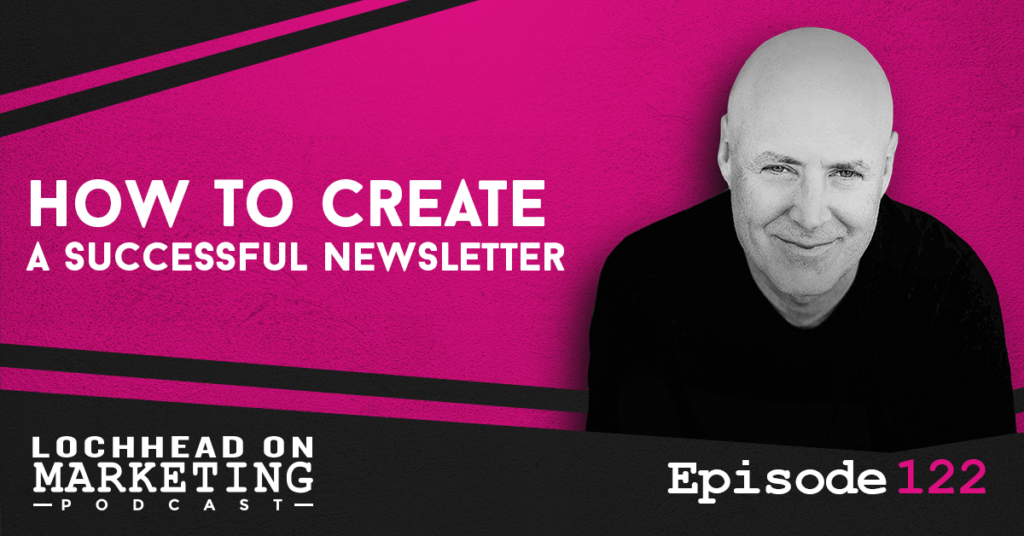
Podcast (lochheadonmarketing): Play in new window | Download (Duration: 16:36 — 11.4MB) | Embed
Subscribe: Apple Podcasts | Spotify | RSS | More
In this episode of Lochhead on Marketing, let’s talk about newsletters. Particularly, how to create a successful newsletter.
Lately, we’ve been getting a lot of questions regarding newsletters: how to create a successful newsletter. With the success we are having on Category Pirates, I would like to share some of my thoughts on how you can create a successful newsletter yourself.
It Is Never Too Late
One of the things you’ll hear when you express the intent to create a newsletter (or podcast for that matter) is that there are already a million other newsletters and podcasts out there. If you hear this statement, stop listening, and continue on.
Just because someone is already doing well in a field you are attempting to be in, doesn’t mean you don’t do it anymore. It just means you have to take a different approach on getting to the top.
The other premise that keeps being pushed around is that people don’t want to read long newsletters. They want soundbites, or easily digestible tidbits of information. Well, we reject that premise, and sought to create a newsletter that we ourselves would want to read.
It turns out, other business leaders also love reading it.
How to Create a Successful Newsletter
That said, here are some tips on how you can write your own successful newsletter.
- Have a different point of view. It’s astounding how much stuff out there is just a regurgitation of the same thing. Figure out what makes you unique, make that true north, and stick to it.
- Bring fresh data, frameworks, and insights. Some people just tend to recycle other people’s data and call it “research”. If you want to be a successful, differentiated newsletter writer, do your own primary data research.
- Write with courage.
- Don’t write anything that is already being written. When something popular is going on, everyone wants to have a hot take on it to ride along the wave. But if everyone is already writing about the same stuff, why would you write about the same thing?
- Don’t “curate” recycled stupidities. If you want to include other people’s work in your newsletter, that’s fine. As long as you make sure what you’re curating is high-quality content.
- Write tight.
- Don’t write anything you’d see in tier-2 magazines. If your content consists of clickbait-y topics and other nonsense, then how are you different from the hundreds of other clickbait websites out there? You will just be another carbon copy of the same thing.
- Know who you’re NOT writing for. It is important to know who your audience is. Although, it’s equally important, if not more, to know who you are NOT writing for. Because the worst thing you can do is listen to the wrong crowd.
- Keep your eye on the ball, not the audience. Don’t obsess about subscriber counts, social media metrics, etc. If you have too little subscribers, it will just bum you out. If you suddenly have an influx of subscribers, it might affect your decision-making and quality of your content.
- Write every day, regardless of how often you publish. You’ll be amazed on how much ideas can come out of the blue. Don’t waste them; write it all down. Also, it will help you improve your writing skills if you put it to practice daily.
- Don’t listen to anyone who tells you the newsletter category is saturated and therefore you shouldn’t do it.
- If you want smart readers, write smart. There’s a difference on writing it so it’s understandable by a huge audience, and dumbing it down to appease the mouth breathers.
- Do work YOU think is legendary. Minimum viable newsletter is as dumb as it sounds. If you’re going to do something, make it legendary.
And here’s a bonus one for the road:
- Don’t be marketing your shit all the time. This is a big turnoff for a lot of readers, especially those who are looking for informative content. A shoutout or two once in a while is good, but don’t make a habit of it.
Bio
Christopher Lochhead is a #1 Apple podcaster and #1 Amazon bestselling co-author of books: Niche Down and Play Bigger.
He has been an advisor to over 50 venture-backed startups; a former three-time Silicon Valley public company CMO and an entrepreneur.
Furthermore, he has been called “one of the best minds in marketing” by The Marketing Journal, a “Human Exclamation Point” by Fast Company, a “quasar” by NBA legend Bill Walton and “off-putting to some” by The Economist.
In addition, he served as a chief marketing officer of software juggernaut Mercury Interactive. Hewlett-Packard acquired the company in 2006, for $4.5 billion.
He also co-founded the marketing consulting firm LOCHHEAD; the founding CMO of Internet consulting firm Scient, and served as head of marketing at the CRM software firm Vantive.
We hope you enjoyed this episode of Lochhead on Marketing™! Christopher loves hearing from his listeners. Feel free to email him, connect on Facebook, Twitter, Instagram, and subscribe on Apple Podcast! You may also subscribe to his newsletter, The Difference, for some amazing content.
121 How to be more creative (Inspired By bestseller “Two Beats Ahead” By Panos Panay & R. Michael Hendrix)
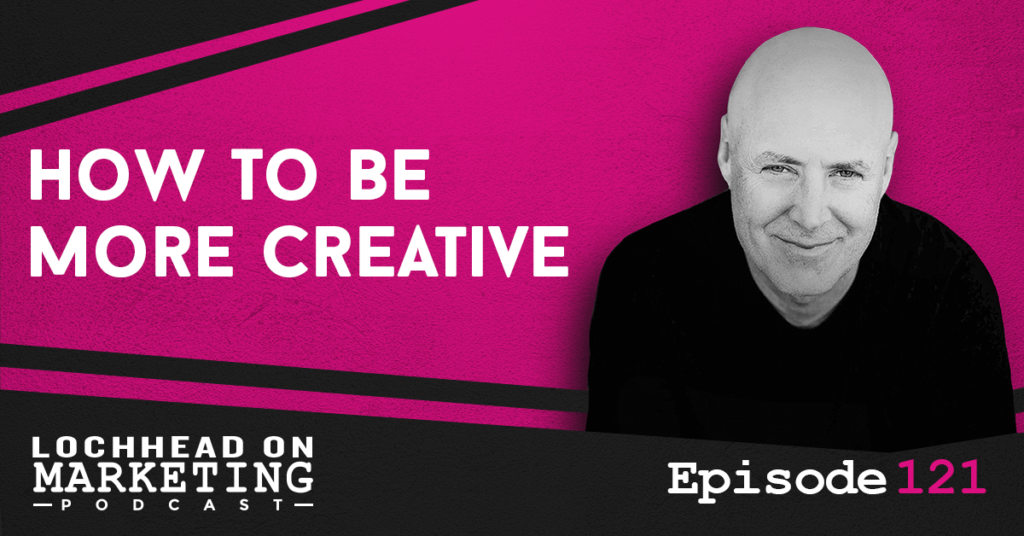
Podcast (lochheadonmarketing): Play in new window | Download (Duration: 13:01 — 8.9MB) | Embed
Subscribe: Apple Podcasts | Spotify | RSS | More
In this episode of Lochhead on Marketing, let’s talk about how to be more creative and two beats ahead of the rest.
I’ve been inspired of late by a new book called Two Beats Ahead by Panos Panay and Michael Hendrix. What I love about this book is these guys are musicians who teach entrepreneurship and how to have an entrepreneurial mind in the musical world, so to speak. This book is about how to take some of the big creating learnings from some of the greatest music artists in the world and apply them in a business context.
If you want to hear more from them, check out this episode of Follow Your Different (FYD episode 218) or get Two Beats Ahead here.
Though for this one, I wanted to focus on the ideas that have been rattling around in my head and in my conversations with marketers and entrepreneurs. So if you want to hear more about it, stay tuned to this episode.
Two Beats Ahead
If you haven’t listened to our conversation at Follow Your Different, you are really missing out. Panos Panay and Michael Hendrix are amazing people, and our conversation about the book and their thoughts on business is legendary.
One of the things we talked about in the books is that they ask a question. When they do workshops, they ask the CEOs, “who would you rather hire, an athlete or a musician?” I thought this was an interesting question, because musicians, particularly ones that write their own music, usually have a high degree of creativity.
Three Takeaways
There are three big ideas I wanted you to take away from how I’ve been taking the learnings from Michael and Panos.
Dare To Suck
The first comes from a quote from Justin Timberlake in the book: “ I only have one rule in the studio, and that’s this: dare to suck.”
I think when many of us are in business jam sessions, whether we are thinking about products or marketing campaigns or new business models and whatnot, we’re in some kind of jam session with a group of people. Our objective is to do some thinking out loud and be creative. Though what tends to happen in these sessions is not about being creative, innovative, and coming up with legendary ideas. It can often be sort of about posturing, looking good, currying favor with the boss, or something along those lines.
I think it’s best to not worry about those things and dare to suck. Let ourselves be free and be open. Don’t worry about what we look and take Justin’s advice: Dare to suck.
Collaboration
As you read through the book, it is painfully obvious that legendary musicians collaborate in a way that is unusual, to say the least. Here’s a quote from the book:
“The company that operates more like a band of collaborators than a strict corporate hierarchy has the ability to shape an environment where everyone feels a sense of belonging.” – Two Beats Ahead
As someone who collaborates with two highly creative people in Category Pirates, having a highly intense and creative environment multiple times a week as we work on the newsletter has been an amazing experience. When you have a group of people who are committed to doing legendary work, who are willing to suck, and willing to jam with each other like a band would, it can be quite rewarding for everyone involved.
The opportunity to be playful and truly collaborative and not give a shit about sucking or how we look is a very freeing thing in business.
Keep Creating, Not Editing
One of the things mentioned in the book is that musicians just keep creating. When they get into a creative zone, they just keep going and not worry about editing it. The time for editing comes later.
I think that’s remarkable as when you think about it, when you have a creative jam session in business, a lot of the time is spent on editing rather than creating. Whenever someone comes up with a new idea, it’s either immediately criticized or shut down. It’s rare that an idea is allowed to be built up by the person who mentioned it or someone else in the session.
So the AHA here is just let the creating keep happening, play a game called “What’s Possible”. I also ask questions like, “If we were legendary, what would we do here?”, or “If we were smart and we were us, what might we do here?” Because we’re definitely us.
Another question I love is what are the headwinds and tailwinds, and how do we harness both to our great advantage?
That said, the main point is to not edit: just keep creating. We over edit and under create in the business world. Let’s be more like legendary musicians and create like crazy and edit later on.
These three takeaways I think are very, very powerful. This book has sort of swiveled around in my head and let me play with these ideas. Hopefully you take a look at the book and have your own takeaways on it as well.
Bio
Christopher Lochhead is a #1 Apple podcaster and #1 Amazon bestselling co-author of books: Niche Down and Play Bigger.
He has been an advisor to over 50 venture-backed startups; a former three-time Silicon Valley public company CMO and an entrepreneur.
Furthermore, he has been called “one of the best minds in marketing” by The Marketing Journal, a “Human Exclamation Point” by Fast Company, a “quasar” by NBA legend Bill Walton and “off-putting to some” by The Economist.
In addition, he served as a chief marketing officer of software juggernaut Mercury Interactive. Hewlett-Packard acquired the company in 2006, for $4.5 billion.
He also co-founded the marketing consulting firm LOCHHEAD; the founding CMO of Internet consulting firm Scient, and served as head of marketing at the CRM software firm Vantive.
We hope you enjoyed this episode of Lochhead on Marketing™! Christopher loves hearing from his listeners. Feel free to email him, connect on Facebook, Twitter, Instagram, and subscribe on Apple Podcast! You may also subscribe to his newsletter, The Difference, for some amazing content.
120 14 Reasons You Should Not Create A Category
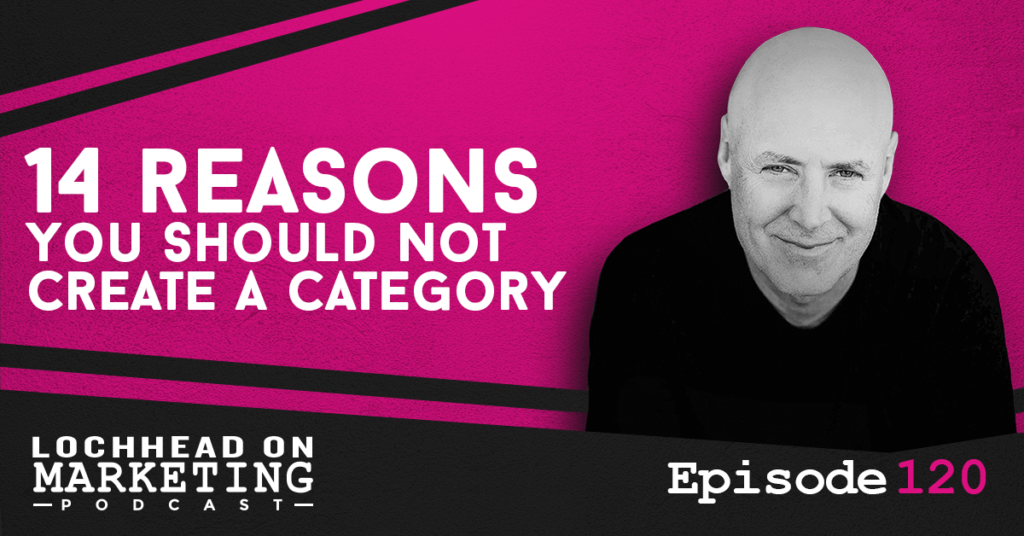
Podcast (lochheadonmarketing): Play in new window | Download (Duration: 6:48 — 4.7MB) | Embed
Subscribe: Apple Podcasts | Spotify | RSS | More
In this episode of Lochhead on Marketing, let us talk about the 14 reasons why you should not create a category.
- You believe in hustling – If you are one of those hustle porn believers, then you believe it’s all about hard work and more hard work. Hamsters in wheels hustle, but they never get anywhere.
- You Believe that the best brand wins – Microsoft spent billions of dollars putting their brand on retail stores, and had their ass handed to them. Google tried to compete head-on with Facebook with Google Plus, and got their ass handed to them. So if you believe the best brand wins, don’t create a category.
- You believe the best product wins – This mindset means you’re aiming for market share instead of creating one.
- If you like to change “strategy” often, you should not create a category.
- If you’re a mercenary, not a missionary – That is to say, you’re only in it for the money.
- You think “re-branding” will drive growth – When a new CMO comes on board, I always look: is there a rebrand that comes out in the next six months? Because nine times out of ten, when a new CMO immediately rebranded the company, they have their head on backwards or up their ass,
- You believe in achieving “product/market fit” – There are a few phrases that have done the damage that that one has done because it tricks legendary marketers and entrepreneurs to thinking they should fit their product into a market. There’s no legend that ever did that.
- “Go-to-market” sounds like a smart thing to do – In many ways, category design is about making the market come to you.
- You think category design is a marketing exercise – If you just want to do a marketing exercise, hire some marketing people to reshuffle some words in your website and call it the day.
- Category designers are expensive and hard to find – That’s true, because they’re in massive demand.
- You think you can win on quality, features, and price – Again, aiming for market share.
- If you believe that marketing products is smarter than marketing problems – Do you believe that you want to market your products, and not the problems? You probably shouldn’t create a category.
- You think asking customers what they want is the best strategy – There are a lot of people who say that business is really not that hard. Just ask me what they want and give it to them.Well, in a blind taste test, 10 out of 10 people said that bottled water was bottled water, and before Évian, 10 out of 10 people said they wouldn’t pay for it. So remember the sage words of Henry Ford: “If I’d ask people what they wanted, they would have asked for a faster horse.”
- You should not create a category because creating demand takes a lot more thinking than capturing demand. – It’s easy to try and run some Google ads and try to capture demand. But the question is, or the issue is she who creates the demand wins.
That’s it, folks. Please stay safe. Stay legendary. And the quote I’ll leave you with today says, “If you don’t think you should create a category, then you probably shouldn’t.”
Bio
Christopher Lochhead is a #1 Apple podcaster and #1 Amazon bestselling co-author of books: Niche Down and Play Bigger.
He has been an advisor to over 50 venture-backed startups; a former three-time Silicon Valley public company CMO and an entrepreneur.
Furthermore, he has been called “one of the best minds in marketing” by The Marketing Journal, a “Human Exclamation Point” by Fast Company, a “quasar” by NBA legend Bill Walton and “off-putting to some” by The Economist.
In addition, he served as a chief marketing officer of software juggernaut Mercury Interactive. Hewlett-Packard acquired the company in 2006, for $4.5 billion.
He also co-founded the marketing consulting firm LOCHHEAD; the founding CMO of Internet consulting firm Scient, and served as head of marketing at the CRM software firm Vantive.
We hope you enjoyed this episode of Lochhead on Marketing™! Christopher loves hearing from his listeners. Feel free to email him, connect on Facebook, Twitter, Instagram, and subscribe on Apple Podcast! You may also subscribe to his newsletter, The Difference, for some amazing content.
119 The Conversation You’re Probably Not Having, That You Probably Should Be Having
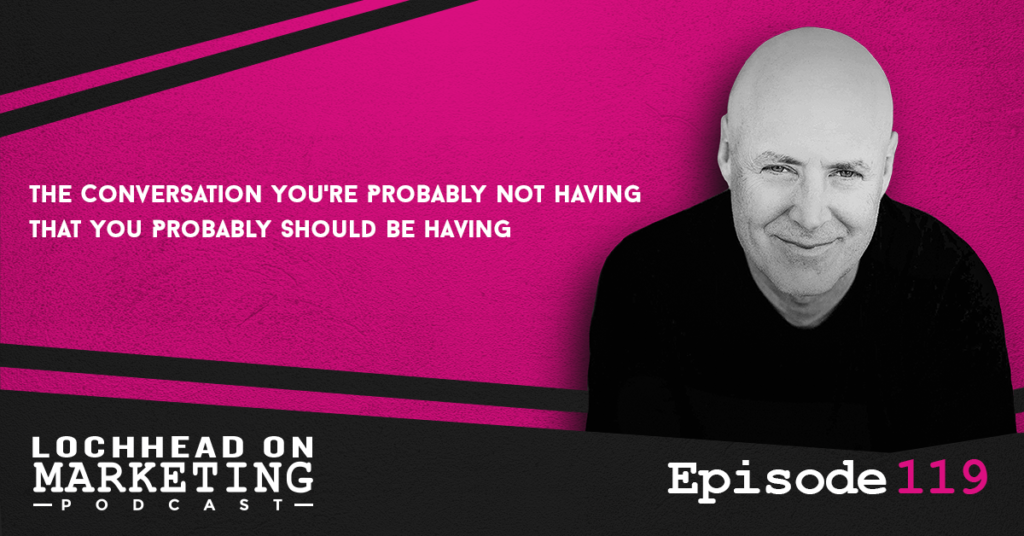
Podcast (lochheadonmarketing): Play in new window | Download (Duration: 19:46 — 13.6MB) | Embed
Subscribe: Apple Podcasts | Spotify | RSS | More
This episode is based on the Category Pirates 
In this episode of Lochhead on Marketing, we continue our discussion on Native Digitals and the impact they are having on the way we live, work, and play. You might find this episode confusing if you haven’t checked out the last two episodes (LOM 116 & LOM 117). You should definitely check them out to be informed of what exactly are Native Digitals and their relevance.
As for this episode, I will try and re-create some of my conversations with entrepreneurs, CEOs & VCs lately about the biggest sea-change in a very long time that is hiding in plain sight. Though for some reason, most people are not talking about it.
Native Digitals vs Native Analogs
Best I can tell Native Analogs (people who are over 35 years old) are pretty much asleep to a massive transformation. The fact that Native Digitals are the first generation of humans ever to grow up integrated with technology and have a digital life experience is lost to them.
The problem with this is the disconnect between a company trying to move into the digital age, but still have Native Analogs for their CEO. Take for instance the WSJ article about working from home. Now that restrictions are lessening, most Native Analog bosses want their employees to be back in the office. Though Native Digitals think otherwise.
“Many CEOs say their companies function best when employees can interact in person. (Though) Workers have indicated in surveys that they want greater flexibility about where and how they work.” – Wall Street Journal
So Native Analog CEOs are saying you’ve got to come back to work. Though a lot of employees, a meaningful percentage of them, are millennials who want to continue working digitally from their homes. Native Digitals are even saying that they’d rather quit than go back to the old office system.
So if you’re a company looking to hire after this new normal, working remote could very well be the signing bonus you can offer to these Native Digitals.
On Digital Creation vs Digital Transformation
The big AHA moment for me here is that this new category of humans are creating a new category of work. They’re not just being transformed digitally. It’s being created anew in the digital space. It’s not just creating an imitation of the office remotely, the remote digital space is their office.
So this Native Digital versus Native Analog conversation has been coming up a lot with entrepreneurs and marketers. The reason behind this is it has profound implications for how we build companies, products, categories, and brands.
“I think the first thing it means is if you’re a Native Analog is that you got to start off by realizing you don’t get it and you got to build a bridge to the Native Digitals. It’s sort of like if you’re a woman, you can empathize about what it might be like to be a man, but you will never truly get it. And of course, the opposite is true as well. ” – Christopher Lochhead
In order to work together, we need to build bridges of understanding to really get some powerful things done. Because as somebody who is Native Analog who works with other Native Analogs and a lot of Native Digitals, there’s something magical here when the two generations could come together.
To hear more on how you can transform yourself to become more digital, download and listen to this episode.
Bio
Christopher Lochhead is a #1 Apple podcaster and #1 Amazon bestselling co-author of books: Niche Down and Play Bigger.
He has been an advisor to over 50 venture-backed startups; a former three-time Silicon Valley public company CMO and an entrepreneur.
Furthermore, he has been called “one of the best minds in marketing” by The Marketing Journal, a “Human Exclamation Point” by Fast Company, a “quasar” by NBA legend Bill Walton and “off-putting to some” by The Economist.
In addition, he served as a chief marketing officer of software juggernaut Mercury Interactive. Hewlett-Packard acquired the company in 2006, for $4.5 billion.
He also co-founded the marketing consulting firm LOCHHEAD; the founding CMO of Internet consulting firm Scient, and served as head of marketing at the CRM software firm Vantive.
We hope you enjoyed this episode of Lochhead on Marketing™! Christopher loves hearing from his listeners. Feel free to email him, connect on Facebook, Twitter, Instagram, and subscribe on Apple Podcast! You may also subscribe to his newsletter, The Difference, for some amazing content.
118 How to YOLO And Execute A “Personal IPO”
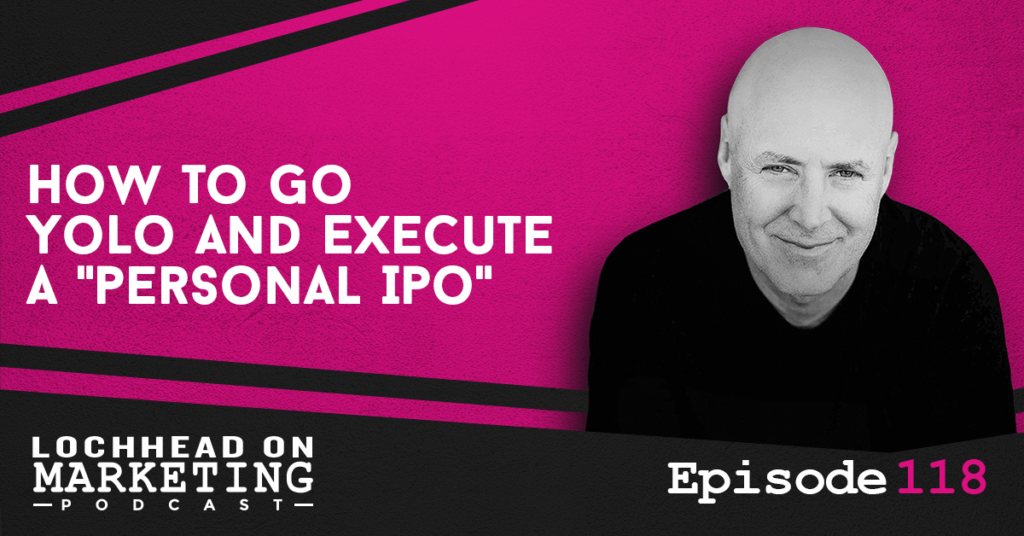
Podcast (lochheadonmarketing): Play in new window | Download (Duration: 19:10 — 13.2MB) | Embed
Subscribe: Apple Podcasts | Spotify | RSS | More
In this episode of Lochhead on Marketing, let’s have a very different conversation about your career. Here’s how you can take the plunge and achieve your “Personal IPO”.
This episode is based on the Category Pirates ?☠️ Newsletter.
The YOLO Economy
Welcome to the YOLO economy.
You’ve probably heard this term. It stands for You Only Live Once. That said, there’s certainly something really interesting going on.
One of the powerful effects of the pandemic is that it has created a sort of a global existential life set of questions and redesign for many people. Millions of people around the world asking the same kinds of questions: Why do I do what I do? Does my work matter to me? Why do I live where I live? Am I making a difference in the world? How do I integrate my personal and professional life?
I’ve always thought work/life balance was a broken paradigm. You only have one life and sometimes you’re working, sometimes you’re not. There’s really not a clear-cut way of dividing and “balancing” it. It all depends on your preference in the end.
According to The New York Times, we are now in this thing called the YOLO economy, and people are saying, screw it and let’s go YOLO.
Taking the Plunge
According to a study by Microsoft, more than 40 percent of the global workforce is considering leaving their employer this year. Blind, an anonymous social network popular among tech workers, shares that 49 percent of its users are planning to land a new position in 2021.
For most people, a good job, nice car, steady paycheck, and a house on the suburbs are no longer enough.
“In the words of Loverboy, many are done “Working for the Weekend”. People want agency, choice, freedom, and meaning.” – Christopher Lochhead
Your Personal IPO
I think as a result of this pandemic, a lot of people are making a shift in their thinking. With all of that said, here are some ideas that might make a difference for you.
One is to think about doing what you might call your personal IPO. And this is an idea that Maddie and Cole have been writing a bunch about. It’s a strategy for finding deeply meaningful work, living a happy and successful and highly profitable life all at the same time.
To those doubting this I say, Why not? Who said we couldn’t have it all? And the sort of concept of a personal IPO is how can we successfully take control of our life and career while achieving agency?
So let’s address three big things:
- How much is agency worth to you?
What are you working for that’s greater than a paycheck? - Who is your Archimedes?
Archimedes said, “If you give me a lever and a place to stand, I can move the world.”
You don’t need the whole world to support you. You just need that one supporter, one client, one customer, or that one opportunity.
- Who is your Auctioneer?
Who can advocate for you is your auctioneer. Your auctioneer is probably a friend, mentor, family member or former coworker. Someone who bolsters you with: “You need to charge 10x more!”Although sometimes, you have to be your own auctioneer. You need to dig deep, look them in the eye and say: “That will be <insert large dollar amount that makes you scared to ask for here>.”
In order to do so, you need to build your Personal IPO. Change your investor base from people who buy on past performance (your former employers) to people who buy on potential. Simply put, you’re swapping out “value investors” for “growth investors”.
Bio
Christopher Lochhead is a #1 Apple podcaster and #1 Amazon bestselling co-author of books: Niche Down and Play Bigger.
He has been an advisor to over 50 venture-backed startups; a former three-time Silicon Valley public company CMO and an entrepreneur.
Furthermore, he has been called “one of the best minds in marketing” by The Marketing Journal, a “Human Exclamation Point” by Fast Company, a “quasar” by NBA legend Bill Walton and “off-putting to some” by The Economist.
In addition, he served as a chief marketing officer of software juggernaut Mercury Interactive. Hewlett-Packard acquired the company in 2006, for $4.5 billion.
He also co-founded the marketing consulting firm LOCHHEAD; the founding CMO of Internet consulting firm Scient, and served as head of marketing at the CRM software firm Vantive.
We hope you enjoyed this episode of Lochhead on Marketing™! Christopher loves hearing from his listeners. Feel free to email him, connect on Facebook, Twitter, Instagram, and subscribe on Apple Podcast! You may also subscribe to his newsletter, The Difference, for some amazing content.
117 How “Native Digitals” Are A Threat To All Companies That Make “Stuff”
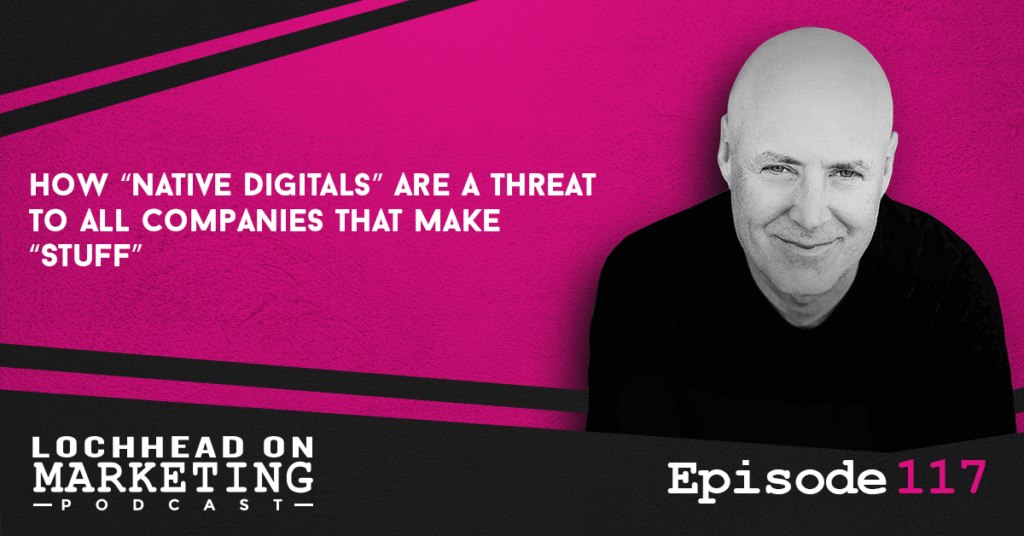
Podcast (lochheadonmarketing): Play in new window | Download (Duration: 25:34 — 17.6MB) | Embed
Subscribe: Apple Podcasts | Spotify | RSS | More
This episode is based on the Category Pirates 
Welcome to a two-part series of Lochhead on Marketing, where we talk about Native Digitals and the profound changes they are bringing to the way we live, work, and play. If you haven’t heard the first episode, why not check it out so you’ll have an idea of what’s going on with Native Digitals.
To recap, there are about 140 million Native Digitals in the United States, and we are witnessing a new category of human beings emerge. One that is fully integrated with the technology for whom their digital life is their primary experience of life.
That last bit puts companies that make “stuff” in a lot of trouble, because it turns out that most Native Digitals don’t want their “stuff” anymore. Which might put a serious dent on the economy, as roughly 30% of the U.S. GDP is in the “stuff” business. Stay tuned to learn more on how they are affected, and how they can adapt to this new market situation.
What Native Digitals Think of “Stuff”
Most millennials and Gen Z are what we call Native Digitals. They grew up in an era where they have observed that their parent’s pursuit of “stuff” did not really lead to as much meaning as they would’ve thought. Suddenly, getting a big house, driving a sports car, and having a lot of trinkets and expensive jewelry doesn’t seem like a priority anymore.
This might be the reason why 74 percent of Americans now value experiences more than physical products. At the very least, the majority of millennials feel that way. Virtual products are now selling for more than their analog counterparts.
This might sound stupid to most people who are Digital Analogs, but you have to realize that their primary experience and interactions are those in the digital space. An example of this is NFTs, which are Non-Fungible Tokens that certain digital artworks now use as a badge of authenticity. Not to mention cryptocurrency, that is slowly creeping into mainstream and becoming a primary “store of value”.
Another reason for the lack of desire for “stuff” is that 70 percent of Millennials aren’t in a financial position to buy a house, even if they wanted to. Which means they don’t have a place to put their “stuff” anyways. Younger generations aren’t even prioritizing getting their licenses, which means less demands for cars and other vehicles. Lastly, Millennials would rather travel and have autonomy in their schedule than land a high-paying job.
If you were a Gen Xer or a Baby Boomer, those statements would have probably driven you into a fit of anger and confusion. What is happening here is the biggest shift in the perceived value of “stuff”. If you’ll remember, nothing, not even human life, has any intrinsic value (LOM #105: Value is 100% Perception).
“Stuff” Companies are in Trouble
Knowing all this, if your company is in the “stuff” business, you might be in a bit of trouble. If you’re company is completely analog and doesn’t offer digital goods or services, you’ll probably be left behind.
This macro trend is happening in plain sight. If your customers are 35 years or younger, they will progressively spend more time, energy, and money enhancing their digital life, themselves, and their careers through products, experiences, and what our friend Joe Pine, author of Experience Economy, calls transformations in your digital life.
So let me say this again. Native Digital people under 35 will progressively spend more time, money, and energy enhancing their lives, their work, their play through digital experiences, products and transformations, not analog ones.
Consequently, it’s starting to look like analog only manufacturers as we know them today will be an ever-decreasing percentage of GDP. Said another way, “stuff”-only categories are going to continue to shrink. Which means that stuff manufacturers need to innovate around digital products, services, experiences and what Joe Pine calls transformations to go along with their physical stuff.
To learn more how analog “stuff” companies can make the shift in this new Digital Native market, download and listen to this episode.
Links
Here are some sources for your perusal:
Per the World Bank, the global GDP has shifted from 54% services in 1996 to 65% in 2018.
Only 10% of first-time brides in their ‘30s and ‘40s received diamond engagement rings.
Native digital women don’t care as much about diamonds.
Bio
Christopher Lochhead is a #1 Apple podcaster and #1 Amazon bestselling co-author of books: Niche Down and Play Bigger.
He has been an advisor to over 50 venture-backed startups; a former three-time Silicon Valley public company CMO and an entrepreneur.
Furthermore, he has been called “one of the best minds in marketing” by The Marketing Journal, a “Human Exclamation Point” by Fast Company, a “quasar” by NBA legend Bill Walton and “off-putting to some” by The Economist.
In addition, he served as a chief marketing officer of software juggernaut Mercury Interactive. Hewlett-Packard acquired the company in 2006, for $4.5 billion.
He also co-founded the marketing consulting firm LOCHHEAD; the founding CMO of Internet consulting firm Scient, and served as head of marketing at the CRM software firm Vantive.
We hope you enjoyed this episode of Lochhead on Marketing™! Christopher loves hearing from his listeners. Feel free to email him, connect on Facebook, Twitter, Instagram, and subscribe on Apple Podcast! You may also subscribe to his newsletter, The Difference, for some amazing content.
116 New Category of Human: “Native Digitals” (People Under 35) Are Radically Different People & Most “Native Analogs” Don’t Get It
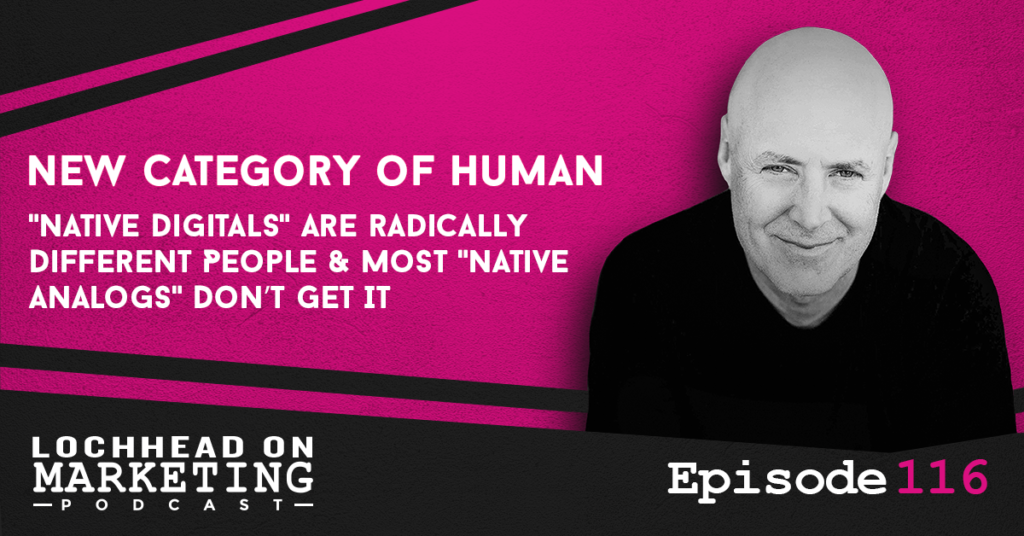
Podcast (lochheadonmarketing): Play in new window | Download (Duration: 15:07 — 10.4MB) | Embed
Subscribe: Apple Podcasts | Spotify | RSS | More
This episode is based on the Category Pirates ?☠️ Newsletter.
Welcome to a two-part series of Lochhead on Marketing, where we talk about Native Digitals and the profound changes they are bringing to the way we live, work, and play.
In this episode, let’s talk about how these younger folks, 140 Million of them in the United States, are the new category of human. These native digitals are the first to grow up completely integrated with technology.
I think it has a profound meaning, and I also think that most people aren’t paying attention.
Native Analogs vs Native Digitals: Perceiving Reality
While having my friends and their kids over one time, I’ve realized something different. While my friends and I are enjoying the beautiful sunset on the beach, the kids were doing something else. They were at their phones, talking to their friends or watching something online. Which seemed like a waste of a perfectly good sunset, though they did take a picture to post on social media.
This got me thinking and gave me the idea: these kids are Native Digitals. It means that their primary experience of life is within the digital one, and their analog life is secondary. That is to say, the photo or video of the sunset is more important than the actual one, because they can show it off to their network.
If you are like me, a Digital Analog, it’s the reverse. Though the insight that I had that morning after that sunset on the beach was quite interesting.
Who are the Native Digitals and Native Analogs?
If you are 35 and above, you are most likely a Digital Analog. You value your life outside technology, and are one of the categories of human that exists today. If we are talking about generations, they fall under the Baby Boomers and Gen Xers who were born in the early 80s or earlier. They make up approximately 136.8 million Americans.
The second category are the Native Digitals. These are millennials and Gen Xers who are born between the early eighties and as recently as the 2010s. The high end of these folks are around thirty-five today and the low end are as young as six years old.
Get this, they make up 140 million Americans.
Why is this Important?
So there’s the great AHA. There are more Native Digitals right now in the United States. As time goes on, the gap between the population of Native Digitals and Native Analogs will widen.
Yet it is our strong suspicion that both category of humans does not understand how profound this change is. It’s not just a normal generation stuff where the older generation has different trends than the newer one.
One major difference is that Native Analogs think of technology as an add-on to their lives, and sometimes even a distraction. Whereas Native Digitals grew up where technology is a necessity and deeply tied to their daily lives. Hence why they think their digital lives and personas are more valuable than their physical ones.
So why is this important? Because some of the biggest companies that are trying to appeal to Native Digitals are being run by Native Analogs. This causes a disconnect in their ideas, and might hurt their company in the long run, either by further showing their lack of comprehension. Or worse, being late to the punch in creating new categories that appeal to these new humans.
It also extends to their company framework. While there are still benefits to having a physical office or venue for work, stubbornly clinging to a full office experience can be detrimental. Especially since the current situation has proved that working remotely is not only viable, but sometimes better.
These are just some of the things to consider, and we would love to tackle it more in the 2nd part of these series.
So think about this the next time you are looking into the sunset on a sandy beach: which type of human are you?
Bio
Christopher Lochhead is a #1 Apple podcaster and #1 Amazon bestselling co-author of books: Niche Down and Play Bigger.
He has been an advisor to over 50 venture-backed startups; a former three-time Silicon Valley public company CMO and an entrepreneur.
Furthermore, he has been called “one of the best minds in marketing” by The Marketing Journal, a “Human Exclamation Point” by Fast Company, a “quasar” by NBA legend Bill Walton and “off-putting to some” by The Economist.
In addition, he served as a chief marketing officer of software juggernaut Mercury Interactive. Hewlett-Packard acquired the company in 2006, for $4.5 billion.
He also co-founded the marketing consulting firm LOCHHEAD; the founding CMO of Internet consulting firm Scient, and served as head of marketing at the CRM software firm Vantive.
We hope you enjoyed this episode of Lochhead on Marketing™! Christopher loves hearing from his listeners. Feel free to email him, connect on Facebook, Twitter, Instagram, and subscribe on Apple Podcast! You may also subscribe to his newsletter, The Difference, for some amazing content.
115 2 Legendary Questions (Part 2)
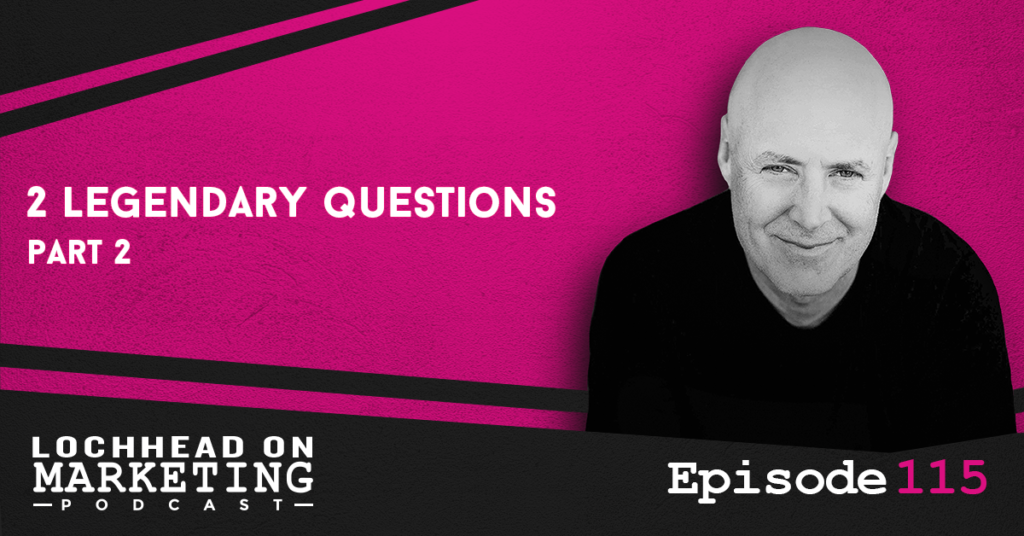
Podcast (lochheadonmarketing): Play in new window | Download (Duration: 9:34 — 6.6MB) | Embed
Subscribe: Apple Podcasts | Spotify | RSS | More
Welcome to a special two-part series of Lochhead on Marketing, where I answer two of the most important questions in my life and career. If you haven’t listened to Part 1 yet, give it a listen here: 2 Legendary Questions (Part 1). Go on, we’ll wait.
Now that you’re all set, here’s part two. Let’s go!
The Legendary Question at the End of a Conversation
If you are an avid listener of Follow Your Different, you have heard me ask this question multiple times. An old friend and mentor of mine named George Brown got me into asking the same question. It goes like this:
“Is there anything else?”
Now, why is that a powerful question, you might ask? First of all, if you went to Sales School, you know that there are two kinds of questions if you look at things on a higher level. There’s open probes and closed probes. A closed probe is a question designed to get a specific answer, while an open probe sort of leaves it to the one that was questioned.
If you listen to me on Follow Your Different, I tend to ask more open questions. Those are all open probes and they’re designed to elicit a lot of information. So generally, when you ask an open probe, hopefully you’ll get more information from the person you’re in communication with.
Is There Anything Else?
Now, as to why this particular question is so powerful in a conversation, particularly at the end, it’s like this:
Often in any conversation, you get the most powerful information at the end. So when you ask someone if there is anything else, what you’re really saying to them is, “Hey, anything else on your mind?” This can elicit a feeling that they might not have given enough information before, and so it opens them up to share more, which you can then follow up with some close probing questions specific to the new information.
You will notice how often that question blows something wide open and when it does.
It’s also a good way to keep the conversation focused on a topic you might be interested in continuing the conversation on, rather than getting sidetracked by another topic. Particularly when the person turns the table and tries to turn the tables on you.
All right. That’s our two-part series on Legendary Questions, starting with “Is this legendary work?”/ “Do you think this is legendary work”, and finishing with “Is there anything else?” I hope you put these two legendary questions to good use.
Bio
Christopher Lochhead is a #1 Apple podcaster and #1 Amazon bestselling co-author of books: Niche Down and Play Bigger.
He has been an advisor to over 50 venture-backed startups; a former three-time Silicon Valley public company CMO and an entrepreneur.
Furthermore, he has been called “one of the best minds in marketing” by The Marketing Journal, a “Human Exclamation Point” by Fast Company, a “quasar” by NBA legend Bill Walton and “off-putting to some” by The Economist.
In addition, he served as a chief marketing officer of software juggernaut Mercury Interactive. Hewlett-Packard acquired the company in 2006, for $4.5 billion.
He also co-founded the marketing consulting firm LOCHHEAD; the founding CMO of Internet consulting firm Scient, and served as head of marketing at the CRM software firm Vantive.
We hope you enjoyed this episode of Lochhead on Marketing™! Christopher loves hearing from his listeners. Feel free to email him, connect on Facebook, Twitter, Instagram, and subscribe on Apple Podcast! You may also subscribe to his newsletter, The Difference, for some amazing content.
114 2 Legendary Questions (Part 1)
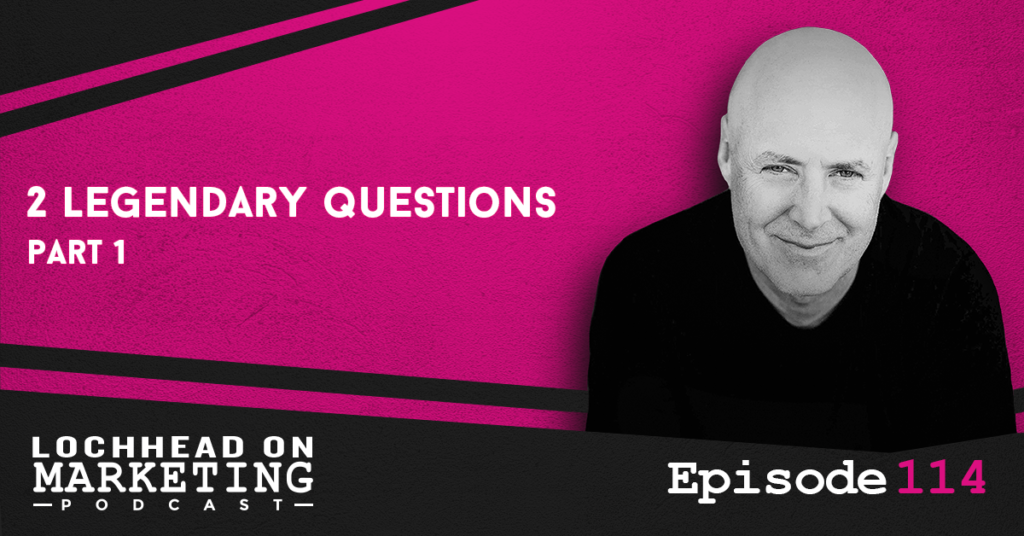
Podcast (lochheadonmarketing): Play in new window | Download (Duration: 10:32 — 7.2MB) | Embed
Subscribe: Apple Podcasts | Spotify | RSS | More
Welcome to a special two-part series of Lochhead on Marketing, where I answer two of the most important questions in my life and career. Are you curious as to what those questions are? Stay tuned to find out.
My Favorite Question to Ask
You need a bit of back story for the first question.
In 2006, I was the head of marketing for a software company called Mercury Interactive. By June of that year, we sold the company for Hewlett-Packard for 4.5 billion dollars, which was a sizeable amount back then.
So as part of the transition to HP, our team met with the team in charge of marketing for the announcement of the acquisition. The marketing strategy was being handled by a famous ad agency; one you’d probably recognize if I describe one of their projects.
After we made our introductions, the head of HP marketing asked me if I had any questions before they start with the presentation. So I asked them a question:
“Do you think what you are about to show us is legendary work?”
That question made them pause for a bit, and the head of said ad agency looked at the head of HP marketing and said, “Can we have two more days?”
Good on them for realizing that they could do better, but it would’ve been better if they gave it their 100% in the first place.
Setting the Bar High
So one of my favorite questions to ask at the beginning of any meeting where somebody is about to show you something. On this case, it was ad creative, but it could be anything. It could be a product prototype, a marketing plan, or a category design. It could even be the justification for why we should buy Company X.
Whatever the thing is that they’re about to present, my favorite question to ask before that is, do you think this work? That is to say, the work they’re about to show is legendary.
What I learned over time is if you want to set a high bar for excellence in your organization, it’s interesting to find out where other people’s bar for excellence is. Because if they don’t bother to show you their best or legendary self, then why would you want to see it?
Now, it’s a different situation when you have something that is a work in progress, and need help in making it legendary. In which case, I ask this question instead: “Do you think we’re off to a legendary start?”
Though if you are presenting something that you think is final or close to the final work, you’ll always get the same question from me:
“Do you think this is legendary work?”
If you want to learn more about my two legendary questions, listen to this episode and check out part two coming soon!
Bio
Christopher Lochhead is a #1 Apple podcaster and #1 Amazon bestselling co-author of books: Niche Down and Play Bigger.
He has been an advisor to over 50 venture-backed startups; a former three-time Silicon Valley public company CMO and an entrepreneur.
Furthermore, he has been called “one of the best minds in marketing” by The Marketing Journal, a “Human Exclamation Point” by Fast Company, a “quasar” by NBA legend Bill Walton and “off-putting to some” by The Economist.
In addition, he served as a chief marketing officer of software juggernaut Mercury Interactive. Hewlett-Packard acquired the company in 2006, for $4.5 billion.
He also co-founded the marketing consulting firm LOCHHEAD; the founding CMO of Internet consulting firm Scient, and served as head of marketing at the CRM software firm Vantive.
We hope you enjoyed this episode of Lochhead on Marketing™! Christopher loves hearing from his listeners. Feel free to email him, connect on Facebook, Twitter, Instagram, and subscribe on Apple Podcast! You may also subscribe to his newsletter, The Difference, for some amazing content.

